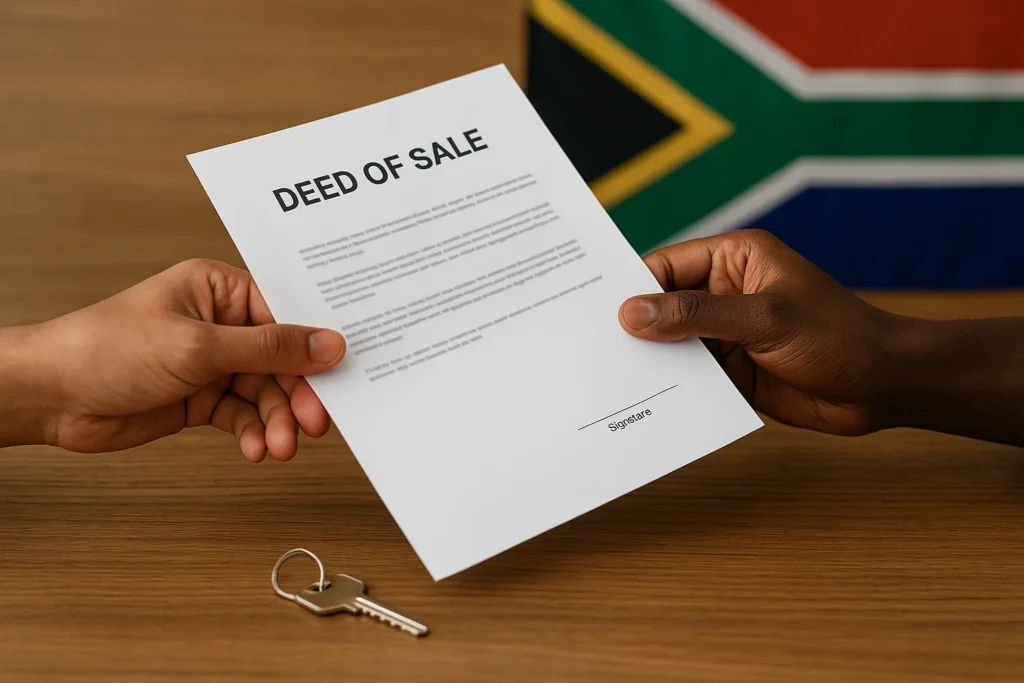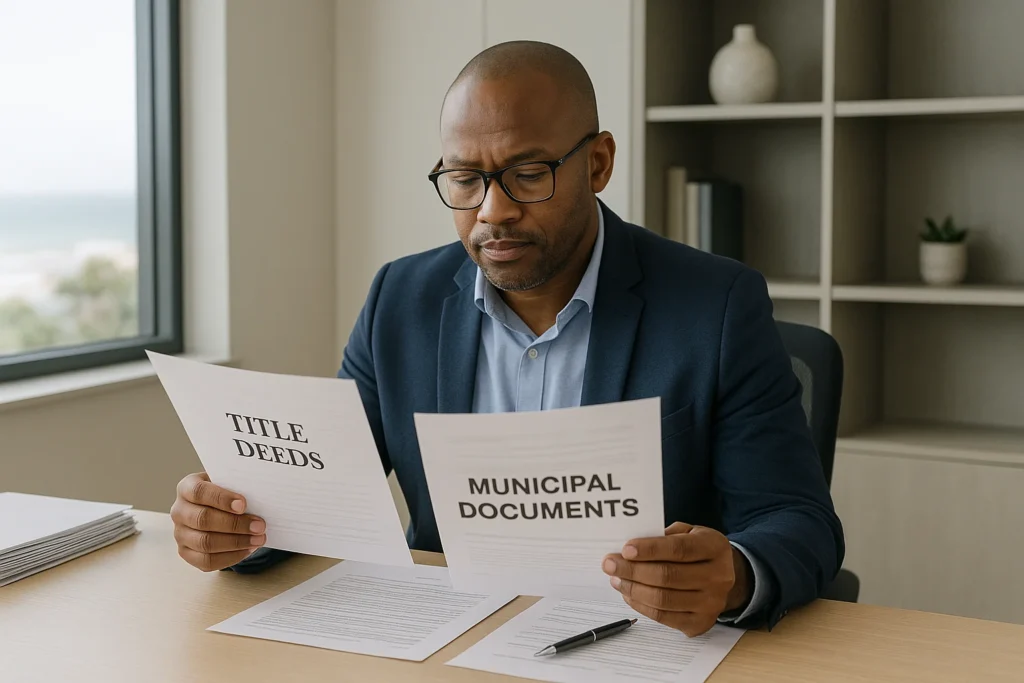Property law & conveyancing is the cornerstone of secure property transactions in South Africa. Whether you are buying your first home, transferring an inherited estate, or negotiating commercial leases, experienced conveyancers and property lawyers protect your title, your finances and your peace of mind.
What is Property law & conveyancing?
Property law & conveyancing combines legal rules about ownership (property law) with the practical legal process of transferring ownership (conveyancing). In South Africa this includes preparing and checking title deeds, ensuring compliance with municipal rates, arranging bond registrations and following Deeds Office requirements. Conveyancing is a specialist field: only attorneys admitted to practice and authorised as conveyancers may act in transfers. According to the Law Society of South Africa, licensed conveyancers are regulated professionals who must follow strict procedural and ethical rules.
How does the conveyancing process work in South Africa?
The conveyancing workflow follows several key stages and usually runs from offer acceptance to registration. A typical timeline includes drafting the deed of sale, conducting property searches, submitting transfer documents to the Deeds Office, and finally registering the transfer and any mortgage bonds. Property law & conveyancing ensures every step — from drafting to registration — complies with South African property and contract law.
Typical stages:
- Offer and acceptance: the purchase agreement (deed of sale).
- Due diligence: title deeds, municipal accounts, rates, zoning and compliance certificates.
- Financing: bond application and bond attorney instructions if the buyer uses a mortgage.
- Preparation and lodgement: conveyancer prepares transfer documents and lodges at the Deeds Office.
- Registration and final accounts: registration complete, funds cleared and keys handed over.
According to the Deeds Office of South Africa, registration times vary with complexity and workload but generally range from a few weeks to several months depending on bond registration and searches.

What searches and title checks are required when transferring property?
Property law & conveyancing requires a thorough title search and a set of statutory checks. The conveyancer will pull the title deed, reveal any servitudes or restrictions, confirm ownership, and check for municipal compliance (rates, water, electricity). These checks also identify third-party rights or pending disputes that could affect the transfer.
Common searches and checks:
- Title deed examination (ownership and conditions).
- Municipal account checks (rates and taxes up to date).
- Levy statements for sectional title properties.
- Bond searches to release or register mortgage bonds.
- Clearance certificates (electrical, water, gas where applicable).
Completing these searches protects buyers and sellers by exposing issues before lodgement at the Deeds Office.
How much do conveyancing and transfer costs normally cost?
Costs depend on the sale price, whether a bond is required, and the complexity of the title. Conveyancers charge transfer fees (which are often sliding-scale based), plus duty (if applicable), Deeds Office registration fees and bond registration costs. Property law & conveyancing professionals provide a full cost breakdown before lodgement so clients can budget with confidence.
Typical cost components:
| Item | Who pays |
|---|---|
| Conveyancer’s transfer fee | Seller or negotiable |
| Deeds Office registration fee | Buyer (part of transfer costs) |
| Transfer duty or VAT | Buyer (if applicable) |
| Bond registration fee and bond attorney costs | Buyer |
| Levy and clearance certificates | Seller/Buyer as agreed |
According to the South African Revenue Service (SARS), transfer duty and VAT rules determine whether a transaction is subject to tax, so an early tax assessment by your conveyancer avoids surprises.
How can buyers and sellers protect themselves during a property transaction?
Protection rests on clear contracts, proper due diligence, and using accredited professionals. Property law & conveyancing experts advise on the deed of sale clauses, suspensive conditions (subject to finance), and remedies for breach. They also confirm municipal compliance and ensure that the transfer is free of encumbrances or undisclosed mortgages.
Practical protective steps include:
- Using a written deed of sale with clear dates and conditions.
- Requiring a bank guarantee or electronic payment on registration.
- Insisting on up-to-date municipal and levy clearances.
- Engaging a reputable conveyancer and, where applicable, a contracts attorney for complex commercial terms.
For buyers with family law considerations—such as property acquired during marriage or after divorce—consulting family and matrimonial law experts helps clarify how property is divided and whether consent from a spouse or executor is required. Learn more about family law and related services through our family law resources.
What are the most common conveyancing pitfalls and delays?
Delays usually arise from incomplete documentation, outstanding municipal accounts, bond registration holdups, and errors in the title deed. Property law & conveyancing professionals anticipate these pitfalls and help clients resolve them quickly, but awareness helps manage expectations.
Common pitfalls:
- Missing or incorrect ID or company documents for parties.
- Unpaid rates or tax liens affecting transfer.
- Complex sectional title levy disputes or defective title conditions.
- Discrepancies between sold property measurements and municipal records.
According to the Deeds Office and conveyancing professionals, incomplete documentation is the single biggest cause of lodgement delays — early document collection reduces the risk.
What is the role of the conveyancer and how do they differ from a solicitor?
In South Africa a conveyancer is an attorney authorised to carry out transfers of land and the registration of mortgage bonds. Their role in property law & conveyancing is technical and procedural: preparing transfer documents, obtaining searches, calculating rates and taxes, and lodging at the Deeds Office. Conveyancers are specialists within the legal profession and often work with other specialists — estate planners, family law attorneys or contracts lawyers — when transactions intersect with other legal issues.
Key responsibilities:
- Drafting and examining transfer documents and endorsements.
- Coordinating with bond attorneys and banks for financing.
- Ensuring compliance with Deeds Office and SARS requirements.
- Preparing final accounts and ensuring proper disbursement of funds.
If your transaction also involves marital property regimes, wills or disputed estates, a coordinated approach with estate planning and family law experts gives you a full-service solution; see our estate planning and family law pages for cross-practice support.

How does conveyancing intersect with family law, estates and wills?
Property law & conveyancing often crosses into family law and estate planning. Matrimonial regimes (in community of property, out of community of property with or without accrual) determine whether a spouse must consent to a transfer. Similarly, if a property forms part of an estate, the executor or heirs must comply with the estate administration and transfer processes. Conveyancers and estate lawyers work together to obtain letters of executorship, settle debts of the estate and arrange for lawful transfer to beneficiaries.
Practical considerations:
- Property transferred during divorce settlements may require court orders or antenuptial contract scrutiny.
- Estate transfers require letters of executorship and compliance with the Administration of Estates Act.
- Wills must be clear about property distribution to prevent disputes at transfer.
According to Statistics South Africa, household formation and inheritance patterns influence property market dynamics, and properly managed estate planning reduces costly disputes.
What extra checks apply to commercial property and development transactions?
Commercial transactions introduce contract complexity and regulatory checks: zoning and land-use permissions, commercial lease agreements, environmental compliance, and due diligence on tenants. Property law & conveyancing in commercial matters involves careful review of title conditions, servitudes, and any development or rezoning restrictions that could impact future use.
Checklist for commercial conveyancing:
- Zoning certificates and municipal land-use approvals.
- Environmental and specialist reports where required.
- Existing lease agreements, tenant estoppels and rental profiles.
- Special servitudes, rights-of-way and bulk utility considerations.
For contract drafting, negotiation and commercial risk allocation, your conveyancer will often coordinate with a contracts attorney to create robust sale agreements or commercial lease documentation.
How long does property registration take and what affects timing?
Registration time depends on the completeness of documentation, municipal responsiveness, and whether a bond is registered. Simple transfers without a bond may be completed in a few weeks, while bonded or complex transfers can take several months. Property law & conveyancing specialists manage expectations and work proactively with banks and the Deeds Office to speed the process.
Factors affecting timing:
- Completeness and accuracy of the transfer documentation.
- Clearing of municipal and service accounts.
- Bond registration complexities or bank delays.
- Deeds Office caseload and provincial processing speed.
According to conveyancing practitioners and Deeds Office guidance, delays are most often caused by missing documents or unpaid municipal charges — early intervention from a conveyancer reduces these risks.

Why choose professional conveyancing attorneys in Durban and how can you get started?
Using seasoned property law & conveyancing attorneys offers clarity, speed and fewer risks. In Durban and across South Africa, experienced teams coordinate sale agreements, title searches, municipal compliance and bond registrations so you don’t face unexpected issues on registration day. We combine property, family law, estate planning and contract expertise to provide a full-service offering tailored to homeowners, developers and businesses.
How to get started:
- Contact a professional conveyancer early — ideally as soon as the offer to purchase is drafted.
- Provide the conveyancer with ID, title deeds and any company or trust documentation.
- If financing, instruct the bond attorney to liaise with your lender.
- Request a written cost estimate and timeline from your conveyancer.
For specialist assistance with property law & conveyancing, estate planning or contract law in Durban, explore our conveyancing services and complementary legal services: start at our professional conveyancing page, review estate planning guidance, or contact our family law team for matrimonial property issues. If you need tailored contract advice for a commercial deal, our contracts attorney resources are available, and you can request specific legal advice through our contact portal.
Frequently asked next steps and where to get legal help
If you are ready to move forward, collect the documents listed above and book an initial consultation with a conveyancer. In complex matters — divorce, estates, commercial developments — a coordinated plan with family law, estate planning and litigation specialists reduces risk and time. You can start the process by getting legal advice directly through our firm’s portal and scheduling an appointment with a conveyancer or relevant specialist.
Useful next steps:
- Gather ID, title deed, municipal accounts and any bond documents.
- Confirm who will pay transfer costs and prepare for tax implications.
- Engage a conveyancer and, where necessary, instruct a contracts attorney or family law specialist.
For help, visit our conveyancing services page, explore estate planning options, meet our family law team, consult our contracts attorney service, or request bespoke advice to begin. For general legal support and queries, you may get legal advice directly via our site.
Additional reading on the statutory and historical aspects of conveyancing is available on Wikipedia.
Contact our team to ensure your property transaction in South Africa is handled by professionals who understand property law & conveyancing, family law intersections, estate planning and commercial contract risks. With the right legal partner, your property deal is secure, compliant and completed with confidence.


